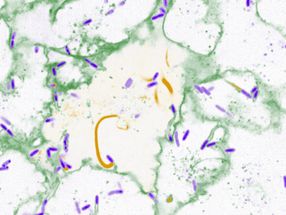HPI Presents Instantaneous Genome Analysis at World Health Summit
A new database technology from Hasso Plattner Institute (HPI) holds the promise of utilizing personalized medicine on a comprehensive scale. This technology is to be presented at the World Health Summit on October 24th in Berlin. Originally developed for corporate software and honored with the 2012 German Innovation prize, In-Memory Technology will also help in the future to analyze and evaluate huge amounts of medical data in real-time. Complicated and expensive treatments, such as those for cancer patients, could then be carried out faster and better tailored to fit each patient.
“Personalized medicine aims to base treatment decisions on all patient- specific information. To be able to do this in the future increasingly more data must be processed during the treatment and, for instance, the “construction plan” of every single person - the DNA, must be examined for genetic changes,” said the director of HPI Prof. Christoph Meinel. According to the computer scientist, this entails huge amounts of data since every human being carries around approximately 3.2 billion pieces of genetic information.
Researchers led by Dr. Matthieu-Patrick Schapranow, from the chair of HPI founder Prof. Hasso Plattner, tackle the huge mountain of data with a 1,000 core high-performance computer cluster - one of the three of this kind worldwide. “To analyze genetic changes in real-time, we combine the research results of global medical research databases into a knowledge base at HPI. High-performance computing combined with huge main-memory capacities help us to identify genetic dispositions and treatment-relevant supplementary information interactively within seconds, instead of determining it manually over a period of days,” said Schapranow, who works closely with the Charité university hospital. The result: the instantaneous analysis of genome data via a cloud application.
Until now, physicians and researcher had to spend weeks of their valuable time researching medical literature and latest medical research results on the Internet. Thanks to the HPI technology, genome data analysis now takes only a few seconds. If mutations are discovered with relevance to the illness, the technology saves the oncologist many laborious individual queries in scientific databases. Instead, the results are sorted automatically according to their relevance and in comparison to all internationally-known research results. In this way, the most current knowledge about an illness can always be incorporated into its treatment.
Additionally, doctors get decisive supplementary information in the genome browser of HPI about every mutation displayed in terms of its frequency, related diseases, pharmacological relationships, possible active substances, as well as clinical studies that allow a more specific treatment.
Most read news
Topics
Organizations
Related link
Other news from the department science

Get the life science industry in your inbox
From now on, don't miss a thing: Our newsletter for biotechnology, pharma and life sciences brings you up to date every Tuesday and Thursday. The latest industry news, product highlights and innovations - compact and easy to understand in your inbox. Researched by us so you don't have to.

























































